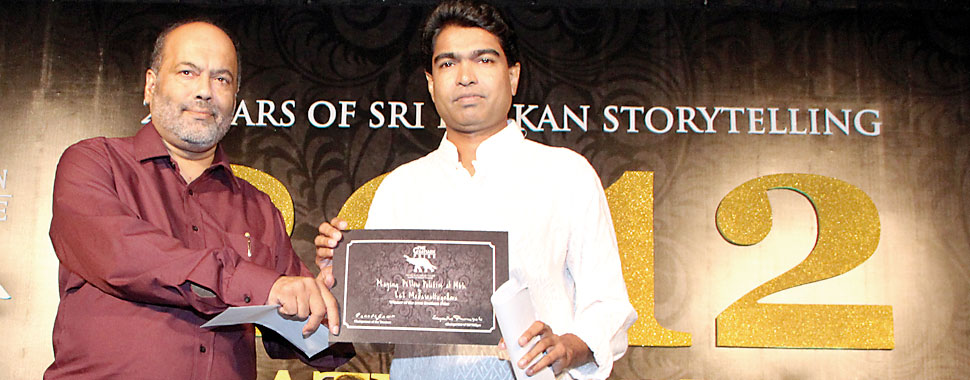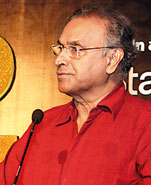Everyone has a story to tell, that’s where Lal steps in
View(s):Teacher, academic, writer and musician — the interests of Gratiaen Prize winner for 2012 Lal Medawattegedara are as diverse as his ability to ‘see the world through many different glasses’. Here Smriti Daniel catches up with the writer to discuss his award-winning manuscript ‘Playing Pillow Politics at MGK’.
When Lal Medawattegedara asks me for a pen and paper, it isn’t to write. Instead, the winner of the Gratiaen Prize for 2012 intends to try his hand at drawing. Outlined on my pad is the MGK of his title, a mountain known as the Maha Geeni Kanda for how its silhouette resembles the shape of a woman’s body.

Three years in the making: Lal Medawattegedera receiving the Gratiaen Award 2012 from Dr. Walter Perera of the Gratiaen Trust. Pic by Indika Handuwala
In his roughly sketched introduction to the geography of his fictional universe Lal points out the location of the shrine that Sujatha meniyo had built; the dense cluster of buildings where World Bank, the money lender was holed up, the house where golf course employee and part time voyeur Victoria malli kept an eye on things and the plot where humble parking lot attendant Toyota nanda plied her trade. Then he tells me that, as of the first page of his book, they’re all gone. “The story is who these people were, how they lived and then how they vanished,” says Lal.
The fate of their homes is made clear in an advertisement that runs in the New Yorker magazine, inviting guests to come and sample the delights of The Cassia Palace, a luxury boutique hotel (the star attraction is the shrine that has now been made into a sky bar). For Lal, the advertisement was the starting point of ‘Playing Pillow Politics at MGK’. “I deconstructed the ad,” says Lal, “and from there I took it backwards.”
The book’s chapters span a week in the life of a young invalid and are labelled Saturday through to the next Sunday, with an epilogue that follows nine months later. Each section focuses on an individual member of the doomed community on MGK, as told by the boy to a CFL bulb. The narrator is convinced he will die by the end of the week, and feels compelled to unburden himself to the only listener available. Lal, who sits under such a bulb himself when working at home, says he got the idea when he noticed how the bulb’s “snake head” spiralled up to the base of the fixture.
“I thought the story would be in the mercury. As you know anyone who touches mercury gets a rash, and stories are like rashes.” By honouring a vanished community, Lal was making a point. “Everyone has a story to tell, that’s what drives me,” he says. “Certain people would want us to forget certain things but these things and people are part of us anyway. If we repress them we pay a big price.”
Commending the work, Jayantha Dhanapala, chairman of the Gratiaen panel of judges said “The novel succeeds best at the level of allegory. It is therefore an extended metaphor of our community with all its political, economic and social complexities treated with supreme irony – witty at times and at other moments with deep sympathy.” As a writer, Lal had found humour an invaluable way of “telling the truth” in a form that was both palatable and encouraged introspection.
Lal’s sense of humour had guests chuckling when his excerpt was read at the shortlist announcement. When people came up to him after the event to tell him they were rooting for him, Lal allowed himself to consider that he might win for the first time. Some of his doubts about his first novel lay in the fact that he had not been able to show it to anyone before submitting it to the Gratiaen Trust, that he had found flaws and spelling errors in the manuscript and that he half suspected the panel of judges would say to him ‘Lal, this isn’t a novel, it’s another collection of short stories.’ Now, he’s reassured. “I think they saw that the novel was held together by contention, rather than linear time because this boy wanted to tell the story of all those who had lived.”
Lal, who was nominated for the Gratiaen in 2002 for ‘The Window Cleaner’s Soul’ (he made his debut with another short story collection – ‘Can You Hear Me Running?’), says this novel has been on his mind for three years now. He just never found the time to bring together the odds and ends including the opening paragraph, which he had jotted down on notebooks. It wasn’t until the Federation of University Teachers’ Association (FUTA) began their 100 day strike that Lal began writing every morning from 9 to 11. The book is dedicated to FUTA and Lal remains proud of the protests he participated in, in Galle, Kandy and Colombo that asked the state do more for education in Sri Lanka.
A lecturer in English Literature at the Open University, Lal was also studying for his Masters at the time. His research interest was in masculinity. Both published/presented in 2012, ‘Pumping Iron: The Question of Masculinity in Blue Stories for Adults’ and ‘Blowing up the Cover: A gendered re-reading of the glossy sexual/textual trap of the cover stories of Guys Only (GO) magazine’ hinted at his willingness to tangle with popular culture. In fact, Lal’s career includes a stint in advertising and a spell as rock musician, and his interests remain diverse. In his acceptance speech, he sampled Pink Floyd lyrics and quoted theoretical physicist Richard Feynman between references to Orhan Pamuk, Salman Rushdie, Galileo, Darwin and Julian Assange. (Rather endearingly, he also thanked the librarians and book sellers who supply him with his reading material.)
Despite his Gratiaen success, Lal says his priority is still his students. “I love teaching literature,” he says. “Right now I prefer to be a teacher, an academic and then a novelist. In another life I would like to be a musician.” His book is being put through a language edit and he’s still waiting to design a cover but it will be out well before the next Gratiaen winner is announced. Both as a writer and as a teacher he seems determined to subvert snobbery: “Just because you read Shakespeare, don’t think E.J. James can’t write,” he says, explaining that his personal challenge is always to create a multiplicity of perspectives within his work. “You must be able to see the world through many different glasses.”
20 years and more to come

Jayantha Dhanapala addressing the audience
The Gratiaen Prize celebrated its 20th year with the announcement of 2012’s winner at a ceremony held on May 4. Themed around “twenty years of Sri Lankan story telling” the ceremony honoured previous winners of the prize, even as it added to their number.
Gratitude abounded as both judges and participants acknowledged founder Michael Ondaatje who set up the Trust with his Booker Prize winnings in 1993. The current value of the prize is Rs 200,000 and the H.A.I Goonetileke Prize for Translations (which offers the same prize money) is awarded every other year.
The judging panel of the 2012 Gratiaen Prize included Jayantha Dhanapala, former career diplomat (chair), Sumathy Sivamohan, academic, writer, dramatist and filmmaker and senior journalist Lyn Ockersz.
Addressing the gathering, Mr. Dhanapala began his speech by noting that even the most “caustic critics” of the Prize must concede that it had “leavened our cultural scene.” He went on to add: “The far-sighted companion H.A.I. Goonetilleke Prize for the best translation ensures the cross-fertilization of the writing talent in our country in all three languages.” (The latter will be awarded next year.)
The grand prize might have gone to ‘Playing Pillow Politics at MGK’ by Lal Medawattegedara, but he had strong competition from other works on the shortlist namely: ‘It’s not in the Stars’ by Rizvina Morseth de Alwis, ‘Kalumaali’ by Ruwanthie de Chickera and Nadie Kammallaweera, ‘Open Words are for Love-Letting’ by Malinda Seneviratne and ‘The Professional’ by Saroj Sinnetamby.
Speaking at the event, Anirvaran Ghosh Dastidar, CEO, Standard Chartered Bank said: “The bank is very proud of its long affiliation with the award which is now celebrating its 20th year. The prize has successfully provided an impetus to encouraging creative writing in English in the country, and we look forward to seeing even greater enthusiasm as the years progress.”
Follow @timesonlinelk
comments powered by Disqus


